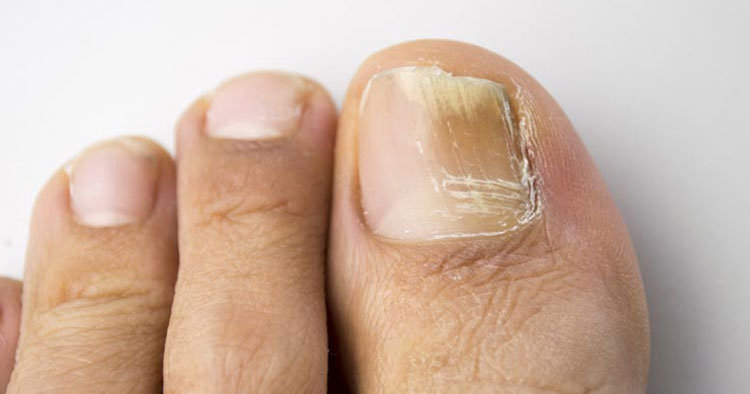Do you have yellow / white thickened nails?
Do you have discoloured, thickened nails? It could be a
fungal infection (onychomycosis)! Whether this is something you’ve noticed over the last week, or something that has been present for many years Fungal nails may appear in a number of ways. Most notably a yellow/ white discolouration with a thickened, deformed appearance in chronic cases.
What are fungal nails?
An infection is caused by fungi that feed on a protein within our nails called Keratin. These fungal colonies thrive in moist environments (such as underneath your nail) and slowly spread across the entire nail bed.
How do fungal nails occur?
Fungal nails can occur for a number of reasons, but for most people it is an unlucky situation. Fungal spores (yeasts or molds) live in the environment around us, and can become infectious when small cracks in
your nail or surrounding skin provide a portal for entry. Nail lacquers such as polish, shelac and acrylics increase the likelihood of developing a fungal infection as they provide the perfect envrionment for fungus to thrive: warm, moist and humid. Which is why as podiatrists, we often see fungal infections in those with long term polish use.
Hot, humid environments will also increase your chances of having a fungal infection, such as school showers, public pools and public baths.
What do they look like?
You may have fungal nails if you have one or more of the following:
- White to yellow-brown discolouration
- Thickened or distorted in shape
- Brittle or cumbly
- Smelling slightly foul
How can they be treated?
The approach to managing your fungal nails will often come down to the extent of the infection. If the fungal diagnosis is fairly recent or only covering a small portion of the nail, you may see results with
conservative treatment. Long term fungal nails may require a number of treatment options. Given the nature of fungal nails, at least 3-6 months is required for any treatment option.
Possible treatment options may include:
- A topical cream that is applied directly on the nail
- A topical nail lacquer
- An antifungal prescription pill: has been shown to be effective, can
have impacts on the liver. You will need to check with your GP
first
- Fungal laser treatment
What is fungal nail laser treatment?
Our FOX heat laser emits a infrared light at a wavelength that passes through the nail plate into the fungi, which exposes the fungi to high temperatures that reduce their ability to replicate. With hundreds of patients treated as well as comprehensive scientific backing, we have found the fungal laser treatment works with a 70-80% success rate. The great thing about the fungal laser is that there are no side effects
to the surrounding nail or skin, no anaesthesia required and no “recovery” period following the procedure. It is perfectly safe and you will only feel a mild warmth during the treatment.
If you’ve been struggling with fungal nails, be sure to book in
an appointment with The Movement Centre today. Our
podiatrists are experts at managing all foot conditions and would be happy to guide you through
the best treatment options for your fungal nails.



